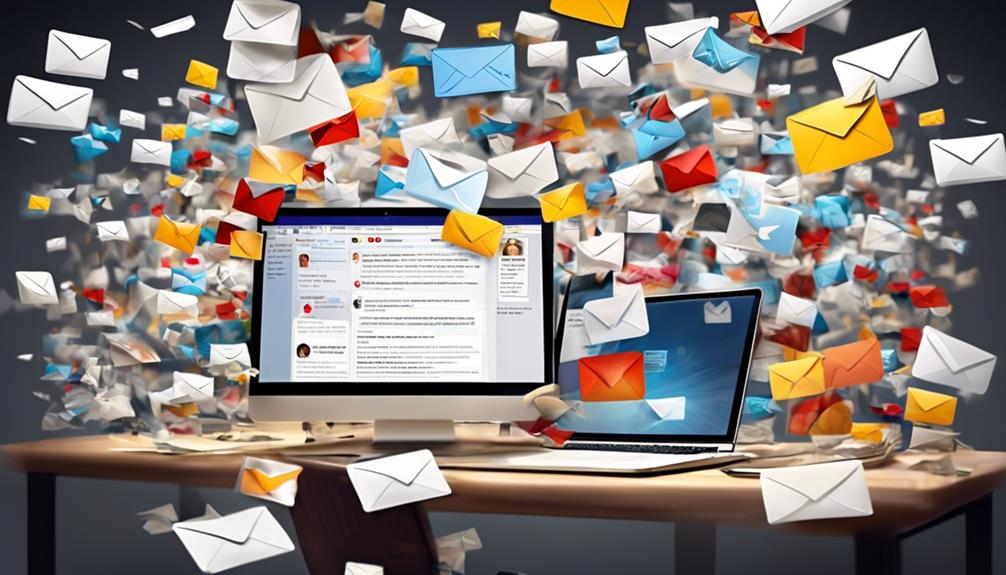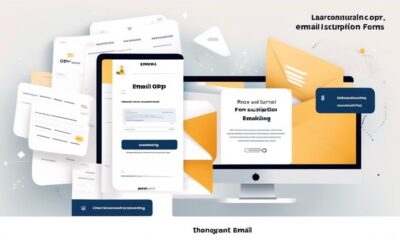Email Subject Line
Worst Email Subject Lines
Keen to avoid the biggest email subject line mistakes?

In the world of email communication, we’ve all had that moment of dread upon spotting a subject line that instantly makes us recoil. The significance of a thoughtfully formulated subject line is paramount in the field of email marketing and should not be overlooked.
Join us as we explore some common pitfalls and the worst offenders when it comes to email subject lines. Let's uncover how certain words and tactics can quickly turn your email from a potential open into an instant delete.
Key Takeaways
- Avoid SPAM trigger words to increase email deliverability.
- Craft customer-centric subject lines that convey immediate value.
- Use spell check tools and appropriate punctuation for professionalism.
- Incorporate brand names strategically to enhance recognition and engagement.
SPAM Trigger Words
In today's digital age, we steer clear of SPAM trigger words like 'Earn $$$' and 'Free offer' to ensure our emails reach the right inboxes. Using these words is the digital equivalent of yelling, pushing away potential prospects before they even open the email. As masters of email marketing, we understand that the worst email subject lines are often filled with clickbait subjects that promise the world but deliver disappointment. By avoiding these terrible subject lines, we respect our audience's time and attention, ensuring that our messages are received positively.
When crafting subject lines, we meticulously research lists of common SPAM trigger words for our industry. The last thing we want is to trigger unconscious alarm bells that send our emails straight to the spam folder. Words like 'free,' 'guaranteed,' or 'limited time offer' are red flags that we steer clear of. We also stay away from excessive punctuation, symbols, all capital letters, and exclamation marks, as these can make our emails appear spammy. Our goal is to create subject lines that captivate without misleading, engaging our audience without resorting to tactics that could harm our reputation.
Time-Related Requests

As we navigate the realm of email subject lines, steering clear of SPAM trigger words like 'Earn $$$' and 'Free offer', we now shift our focus towards crafting effective Time-Related Requests that respect our audience's valuable resource.
When it comes to requesting time in a subject line, it's crucial to approach it with finesse and consideration. Here are some key points to keep in mind:
- Build Rapport First
Establish a connection and provide value before making any time-related requests in the subject line.
- Be Clear and Customer-Centric
Use language that's clear, customer-centric, and immediately conveys value to the recipient.
Typos in Subject Lines
Let's dive into the world of email communication and address the subtle yet impactful issue of typos lurking in subject lines. Subject lines with typos can instantly diminish the professional image you aim to convey. To emphasize the importance of attention to detail, here's a helpful table:
| Common Typos in Subject Lines | How to Address Them |
|---|---|
| Spelling errors | Use spell check tools like Grammarly to avoid mistakes. |
| Caps lock overload | Avoid using excessive capitalization; it can seem unprofessional. |
| Lack of clarity | Ensure your subject line clearly conveys the email's purpose. |
| Excessive punctuation | Stick to appropriate punctuation to avoid looking spammy. |
Before hitting send, always remember to proofread your email. Typos can turn off recipients and reduce open rates. If you spot an error after sending, it's better to delete the email and resend a corrected version. By taking the time to read your email before sending, you can maintain a professional tone and increase the chances of engagement.
Brand Name Mentions

Mentioning brand names strategically in email subject lines can significantly enhance the recipient's recognition and engagement with your message. When incorporating a company name into the subject line, it's crucial to consider a few key points:
- Relevance: Ensure that the brand name mention is directly related to the content of the email. Irrelevant brand mentions can confuse recipients and lead to disengagement.
- Using the company name in a subject line for an email newsletter can signal to the recipient the source of the information, increasing the likelihood of opening.
- Differentiation: Highlight what sets your brand apart. Simply mentioning the company name may not be enough to entice the prospect to open the email.
- For example, in the competitive real estate market, a subject line mentioning the company name alongside a unique selling point like 'Exclusive Off-Market Listings' can pique interest and encourage engagement.
All Caps Subject Lines
Shouting through email subject lines with all caps can inadvertently turn away potential recipients due to the perceived aggressiveness and lack of professionalism. When a subject line is typed in all capital letters, it gives off the impression of yelling, making it one of the worst ways to capture a reader's attention. Not only does it come across as unprofessional, but it also makes the email harder to read and understand.
All caps subject lines are like a Fake Reply – promising something engaging but delivering disappointment instead.
In a world where every character in a subject line counts, using all caps for emphasis is a risky move. Recipients may resist opening emails with subject lines in all caps, assuming they're spam or junk mail. Instead of resorting to shouting, it's crucial to craft subject lines that are clear, concise, and enticing. Remember, the goal is to grab the readers' attention, not overwhelm them with overwhelming formatting choices.
Frequently Asked Questions
What Is a Bad Subject Line?
A bad subject line fails to captivate, engage, or entice the recipient. It lacks clarity, value, and relevance. It may come across as spammy, misleading, or unprofessional.
These subject lines miss the mark by not respecting the reader's time or intelligence.
Crafting compelling subject lines is critical for successful email campaigns, as they're the gateway to opening communication with potential prospects.
What Topics Are Inappropriate for an Email?
Certain topics are inappropriate for email communication. Sensitive or confidential information should be handled with care to protect privacy. Personal or controversial subjects like politics and religion may lead to conflict. Offensive or disrespectful content damages professional relationships. Avoiding these topics ensures clear and respectful communication with recipients.
What Are Examples of Spam Email Subject Lines?
When it comes to spam email subject lines, we steer clear of using trigger words like 'Earn $$$' or 'Free offer.' It's vital to respect the recipient's time and maintain professionalism by avoiding typos.
Crafting clear, customer-centric subject lines is key, steering away from clickbait tactics or excessive punctuation. Misleading or overly pushy subject lines can damage trust and reputation.
We always aim for authenticity and professionalism in our email communication.
How Do You Write a Killer Email Subject Line?
When crafting a killer email subject line, we focus on grabbing attention with concise, customer-centric language. We steer clear of spam trigger words, respect the recipient's time, and maintain professionalism.
Our goal is to highlight the value or benefit, address pain points, and offer solutions. By avoiding clickbait and ensuring clarity, we build trust and credibility.
Our subject lines are clear, engaging, and motivate action.
Conclusion
After diving into the world of email subject lines, it's clear that avoiding spam trigger words, time-related requests, typos, brand name mentions, and all caps is crucial for success.
By steering clear of these pitfalls and focusing on genuine, customer-centric language, we can increase the chances of our emails being opened and read.
Let's leave behind the worst email subject lines and strive to create engaging, valuable content that truly resonates with our audience.
Natali – Editor in Chief (Strategy and Mastery, AI Expert) Natali, our Editor in Chief, is the driving force behind our content’s strategic direction. With a keen eye for detail and a deep understanding of market trends, Natali ensures that our content is top-notch and strategically aligned with our client’s goals. Her expertise in AI helps to seamlessly integrate advanced technology into our marketing strategies, pushing the boundaries of conventional marketing.
Email Subject Line
Win Back Email Subject Lines
Just when you thought your inactive subscribers were lost forever, discover the secret to crafting win-back email subject lines that reignite interest and rekindle connections.

Just like a captivating movie trailer grabs our attention, the subject lines of win-back emails have the power to reignite interest and reconnect with subscribers who have gone quiet.
The art of crafting subject lines that resonate and compel action is a delicate balance of creativity and strategy.
But how do we ensure our subject lines stand out in a crowded inbox and entice recipients to take that crucial next step?
Join us as we explore the science behind effective win-back email subject lines, uncovering the key strategies and tactics that can breathe new life into your re-engagement efforts.
Key Takeaways
- Compelling subject lines are crucial for capturing the attention of customers when trying to win them back.
- Personalization and addressing recipients by name increases open rates and makes customers feel valued.
- Strategic use of emojis can help win-back subject lines stand out in crowded inboxes.
- Including enticing offers or incentives in subject lines can tempt inactive customers to re-engage.
Crafting Compelling Subject Lines
Crafting compelling subject lines is essential for capturing the attention of customers and enticing them to open your win-back emails. It’s crucial to personalize subject lines to make subscribers feel valued. Addressing them by name creates a sense of individual connection and importance.
Emojis can also be strategically used to add visual appeal and stand out in crowded inboxes. Incorporating a special offer in your subject lines can entice customers to open the email and consider making a purchase. By including a tempting offer, such as a discount or freebie, customers are more likely to engage with your win-back campaign.
Engaging subject lines that ask questions can pique curiosity and prompt customer interaction. Testing different subject lines is also vital to determine the most effective approach. Following up with engaging email content is equally important to keep customers interested and optimize your win-back campaign.
Crafting compelling subject lines is an art that, when mastered, can significantly impact the success of your email marketing efforts.
Effective Strategies and Examples

When capturing the attention of customers in win-back email subject lines, personalization, emojis, and enticing offers are essential. Personalization creates a sense of value for the subscribers, increasing open rates. Emojis, when used strategically, add visual appeal and help your emails stand out in crowded inboxes.
Incorporating enticing offers, such as special discounts or exclusive offers, can entice inactive customers to come back. Using engaging questions in your win-back subject lines piques curiosity and prompts recipients to open the email, increasing the chances of re-engagement.
Additionally, testing different strategies like emotional triggers, exclusivity, and A/B testing can optimize the effectiveness of your win-back email campaign. For example, a winback campaign subject line like ‘We Miss You, [Customer’s Name] – Here’s an Exclusive Offer Just for You’ combines personalization, an engaging question, and an exclusive offer, making it compelling for inactive subscribers.
Re-engage Disengaged Recipients
Let’s reignite the spark with disengaged recipients through engaging subject lines and irresistible incentives. Re-engaging inactive subscribers is crucial for the success of our email campaigns.
To win back email subject lines, we need to craft the perfect win-back emails that entice them to open. Personalization is key; addressing recipients by their name can make the email feel more personalized and engaging. Additionally, curiosity-inducing questions can pique their interest and encourage them to open the email.
We must also consider offering incentives or discounts to tempt inactive customers back into our email list. Using emojis strategically can also add visual appeal and help our emails stand out in crowded inboxes.
Once we’ve grabbed their attention with captivating subject lines, we need to follow up with engaging email content to keep the re-engagement process going. Here are some email examples that effectively re-engage disengaged recipients.
Revive Engagement From Silent Customers

To reignite engagement from silent customers, we must captivate their interest with compelling subject lines that make them feel valued and eager to reconnect with our brand. When crafting win-back subject lines for silent customers, personalization is crucial. Including the customer’s name can significantly increase open rates and make customers feel valued. Emojis, when used appropriately, can also help win-back subject lines stand out in crowded inboxes and increase open rates. Additionally, incorporating a special offer in win-back subject lines can incentivize customer retention and entice inactive customers to come back and make a purchase. To effectively revive engagement from silent customers, it’s essential to use curiosity-inducing questions, create a sense of urgency or exclusivity, highlight new products or updates, and include emotional appeals in the subject lines. By implementing these strategies, we can increase the likelihood of silent customers opening future emails and re-engaging with our brand.
Win-back Strategy Description Example Personalization Including the customer’s name to make them feel valued and increase open rates “John, we miss you! Come back for a special offer” Emojis Using emojis to stand out in crowded inboxes and increase open rates “🎁 Don’t miss out on this exclusive offer 🎉” Special Offers Including limited-time offers to incentivize customer retention and encourage a purchase “Hurry! 30% off for returning customers”
Establish Valuable Connections
Establishing valuable connections with our customers is the cornerstone of building lasting loyalty and driving sustained engagement with our brand.
When it comes to win-back email subject lines, the key is to establish a personal and emotional connection with the previously engaged customers. Personalizing subject lines by addressing the recipient by name can make them feel valued and recognized, increasing the likelihood of email open.
Additionally, incorporating engaging emojis can visually stand out and capture the recipient’s attention, making the email more appealing. A powerful motivator for re-engagement is to include a special offer or exclusive deal in the subject line, enticing inactive customers to open the email and consider the offer.
Crafting subject lines as engaging questions prompts recipients to open the email and reignite their interest in our products or services. A/B testing different subject lines is highly effective in identifying the most compelling win-back email subject lines for our audience.
Frequently Asked Questions
What Is the Subject Line for a Winback Email?
We’ve found that personalized subject lines with exclusive offers and emojis can effectively win back customers. Engage with curiosity-inducing questions and create a sense of urgency to increase open rates and customer retention.
What Should Be the Subject of a Reply Email?
We believe the subject of a reply email should be personalized and engaging. Using the recipient’s name and a question can increase open rates. Emphasizing value and an enticing offer can also capture attention and drive action.
How Do You Write a Winback Email?
We can write a win-back email by crafting personalized subject lines, offering special incentives, and strategically using emojis to grab attention. Engaging copy with curiosity-inducing questions and a sense of urgency can optimize re-engagement success.
What Are Some Good Subject Lines for Emails?
Some good subject lines for emails can include personalized offers, strategic use of emojis, special offers, engaging questions, and personalized greetings. These techniques can captivate recipients and entice them to open your emails.
Conclusion
Let’s win back our customers with captivating subject lines that grab attention and drive engagement. By personalizing our approach, offering special deals, and using emojis, we can reignite interest and bring back inactive customers.
Testing different strategies and analyzing data will help us refine our approach and achieve success.
Let’s revive our connections and make our win-back campaign a resounding success!
Erik – Email, SEO, AI Expert Writer Erik is the strategist, the thinker, and the visionary. His role at Influenctor is pivotal in integrating SEO with AI-driven content strategies. With an extensive background in email marketing and a profound understanding of search engine algorithms, Erik develops innovative strategies that elevate our client’s online presence. His work ensures that our content is seen, felt, and remembered.
Email Subject Line
Correction Email Subject Lines
Keen to learn the art of crafting compelling Correction Email Subject Lines? Find out how to grab your recipients' attention and build trust.

When it comes to Correction Email Subject Lines, they serve as the key to fixing mistakes and maintaining customer trust. Getting them right is essential for success, but it can be difficult at times.
We’ve found that the approach to crafting these subject lines is more nuanced than one might think. Join us as we uncover the strategies and best practices that can make your correction email subject lines stand out and capture the attention of your recipients.
Key Takeaways
- Attention-grabbing subject lines are crucial for customer engagement and open rates in correction emails.
- Crafting effective subject lines involves clarity, honesty, and a customer-centered approach, while avoiding negative words and strong adjectives.
- The subject line should clearly communicate that the issue has been fixed and convey a clear message of customer satisfaction.
- Strategies for effective subject lines include addressing the error upfront, using positive language, and considering adding humor when appropriate.
Importance of Attention-Grabbing Subject Lines
Crafting attention-grabbing subject lines is crucial for ensuring customer engagement and open rates when sending correction emails. The subject line is the first impression a recipient has of the email and can significantly impact whether the email is opened or ignored. When it comes to correction emails, the importance of attention-grabbing subject lines becomes even more evident. A well-crafted subject line can help mitigate the negative impact of an error and maintain customer satisfaction.
In the case of a spelling mistake or error, a subject line that conveys sincerity, provides a solution, and reassures the recipient can be highly effective. Humor can also play a role in capturing the recipient’s attention, such as using ‘Oops!’ to acknowledge the mistake in a lighthearted manner. However, it’s essential to strike a balance and ensure that the subject line remains respectful and professional. Clarity and honesty are crucial, as the subject line should clearly communicate the error and its correction without being misleading.
Crafting attention-grabbing subject lines for correction emails is an art that, when mastered, can significantly improve open rates and customer engagement.
Crafting Effective Subject Lines

When addressing the importance of attention-grabbing subject lines in correction emails, it becomes essential to seamlessly transition to crafting effective subject lines that convey sincerity, provide a solution, and engage recipients from the moment they see the email.
Crafting an effective subject line for a correction email involves several key elements:
- Clarity, Honesty, and Customer-Centered Approach: The subject line should clearly communicate the purpose of the email correction, be honest about the mistake, and focus on how it benefits the recipient.
- Straightforwardness and Incorporating Humor: A clear and straightforward subject line can be complemented with humor, such as using ‘Oops!’ to acknowledge the mistake, creating a more engaging tone.
- Avoidance of Negative Words and Strong Adjectives: To maintain a positive tone, it’s important to avoid using negative words or strong adjectives in the subject line, which can deter recipients from opening the email.
- Opportunity for Brand Reputation Enhancement: Correction emails provide an opportunity to own up to mistakes, make amends, and enhance brand reputation with high open and engagement rates.
- Assessing the Severity of the Error: Before sending a correction email, it’s crucial to assess the severity of the error, as minor mistakes may not require a correction email to maintain customer satisfaction.
Best Practices for Subject Lines
We have found that incorporating attention-grabbing subject lines is crucial for effective correction emails. When sending a correction email, it’s essential to make sure the subject line clearly communicates that the issue has been fixed. Here are some best practices for crafting subject lines that will help ensure customer satisfaction and convey a clear and concise message:
Common Mistakes Subject Lines Example Subject Line Sending wrong info “Correction: [Brief Description]” “Correction: Updated Event Details” Bad links “Oops! We Fixed the Issue” “Oops! We Fixed the Broken Link” Non-functional pages “Corrected Version: [Page/Link Title]” “Corrected Version: Checkout Page”
Tips for Noticing and Opening Emails

Upon receipt of an email, promptly review its contents to swiftly identify any potential errors or issues. Here are some tips for noticing and opening emails:
- Scan for Key Information: Quickly scan the email for important details such as the sender’s name, subject line, and any attachments.
- Check for Errors: Pay attention to any spelling or grammatical errors, as well as the overall coherence of the message.
- Assess Urgency: Determine the urgency of the email and prioritize accordingly, especially if it pertains to sending a correction email or addressing an issue in a particular program or service.
- Evaluate Subject Line: Assess whether the subject line effectively captures the essence of the email and entices the recipient to open it.
- Take Action: If the email requires a response or immediate action, consider the best course of action and respond accordingly.
Strategies for Effective Subject Lines
Crafting effective subject lines is essential for maximizing customer engagement and conveying the purpose of error correction emails with clarity and sincerity. When writing a correction email subject line, it’s crucial to address the error or mistake right from the start. Depending on the situation, using positive language instead of negative can help to soften the impact of the error and maintain a positive tone. Additionally, incorporating humor, when appropriate, can humanize the email and strengthen customer engagement. It’s important to remember that the subject line sets the tone for the entire email chain, so it should be the first thing to consider when strategizing for effective subject lines. Below is a table summarizing strategies for creating effective subject lines in correction email marketing.
Strategies for Effective Subject Lines Address the error upfront Use positive language Consider adding humor
These strategies can help ensure that correction email subject lines are compelling, sincere, and effective in engaging customers.
Frequently Asked Questions
How Do You Say Correction in Email Subject?
We make corrections in email subjects by using attention-grabbing phrases like ‘Correction’ or ‘Oops’ to indicate the error. It’s important to promptly address the mistake and convey a positive sentiment to recipients.
What Do You Title an Email Correction?
We title an email correction with a clear and concise subject line that directly addresses the correction being made. This ensures that the recipient can easily identify and understand the purpose of the email.
How Do You Indicate a Correction in a Email?
We indicate a correction in an email by clearly stating the original error, providing the correct information, and offering an apology if necessary. This ensures transparency and helps to maintain trust and credibility.
How Do You Send a Professional Correction Email?
We send a professional correction email by acknowledging the mistake, providing the corrected information, and expressing regret for any inconvenience caused. We ensure clarity, brevity, and a respectful tone in our communication.
Conclusion
Well, we’ve certainly learned the importance of a good subject line, haven’t we? It’s amazing how a few words can make all the difference.
So, next time you’re sending out a correction email, remember to be clear, honest, and maybe even add a touch of humor. It’s all about grabbing attention and making things right.
Oops, did I just give away all our secrets?
Erik – Email, SEO, AI Expert Writer Erik is the strategist, the thinker, and the visionary. His role at Influenctor is pivotal in integrating SEO with AI-driven content strategies. With an extensive background in email marketing and a profound understanding of search engine algorithms, Erik develops innovative strategies that elevate our client’s online presence. His work ensures that our content is seen, felt, and remembered.
Email Subject Line
Valentines Email Subject Lines
Wondering how to capture your subscribers' hearts this Valentine's Day? Uncover the secrets to crafting irresistible email subject lines that will set your campaigns apart.

As Valentine’s Day approaches, crafting the perfect email subject lines is like finding the key to unlock your subscribers’ hearts. With the holiday season behind us, it’s time to shift focus to the next big opportunity for connecting with your audience.
Have you ever wondered what makes a subject line truly irresistible? We’ll explore some creative and effective approaches to captivate your audience and drive open rates for your Valentine’s Day email campaigns.
Join us as we unravel the secrets to crafting compelling subject lines that will set your emails apart from the sea of Valentine’s Day promotions flooding inboxes.
Key Takeaways
- A/B testing different subject lines can maximize the impact of Valentine’s Day email campaigns.
- Compelling language and emojis can add an extra touch of charm and engagement to subject lines.
- Including special offers and discounts in emails can drive sales and prompt immediate action.
- Crafting subject lines with a clear call-to-action and a sense of urgency can maximize engagement and motivate subscribers to take action.
General Valentines Day Email Subject Lines
Capture their hearts with these irresistible Valentine’s Day email subject lines.
When crafting Valentines Day emails, the subject line is your golden ticket to grabbing attention. To help you nail your Valentines Day email marketing, we’ve curated a selection of subject lines to help you stand out and drive engagement.
For those searching for the Perfect Valentines Gift, consider using subject lines like:
- ‘Plenty of Gifts to Show Your Love’
- ‘Will You Be Our Valentine?’
These subject lines evoke a sense of romantic allure and entice customers to explore your offerings.
In addition, for customers seeking Last Minute Gift options, create urgency with subject lines such as:
- ‘Last Minute Valentines: Need a Last Minute Gift for Valentine’s Day?’
- ‘Last Chance For Free Shipping In Time For Valentine’s Day’
These subject lines cater to their needs and encourage immediate action.
To maximize impact, consider A/B testing different subject lines and personalizing them for targeted campaigns. Remember, compelling language and emojis can add an extra touch of charm, so don’t shy away from phrases like:
- ‘Roses are red � violets are blue, here’s a deal for you!’
Infusing emotion and captivating your audience will make your emails more memorable and effective.
Valentines Day Email Subject Lines With Free Shipping

With Valentine’s Day just around the corner, we’re excited to offer free shipping on all our heartfelt gifts to help you share the love. In our Valentines Day email subject lines, we’re highlighting this special offer with attention-grabbing phrases like ‘Last-Minute Valentines – Free Shipping Ends Soon’ and ‘Valentines Day Gifts Shipped Free – Don’t Miss Out!’ These subject lines create a sense of urgency, prompting immediate action from subscribers.
Emojis also add a playful touch, so we’re incorporating them creatively, such as in ‘Guaranteed Delivery for Valentines Day � Free Shipping Ends Tonight!’ and ‘Roses are red � violets are blue, here’s a deal for you – Free Shipping for Valentines Day!’
For those shopping at the eleventh hour, we’re using subject lines like ‘Hurry! Tomorrow Is Valentines Day – Free Shipping on Last-Minute Gift Ideas’ to catch their attention and drive sales.
We’re committed to making your Valentines Day email campaign a success by not only offering free shipping but also including special offers and discounts in our emails. Don’t miss out on our Valentines Day Sale – act now before Free Shipping for Valentines Day ends!
Last-Minute Valentines Day Email Subject Lines
As Valentine’s Day rapidly approaches, our focus now turns to crafting compelling last-minute email subject lines that drive urgency and prompt immediate action from subscribers. To ensure our messages stand out and encourage timely engagement, we’re brainstorming creative and enticing subject lines for our last-minute Valentine’s Day email campaign.
Here are some ideas we’re considering:
- ‘Last Call for Love: Order Your Special Valentines Day Gift Now!’
- This subject line conveys urgency and emphasizes that time is running out to purchase a meaningful gift for Valentine’s Day.
- ‘Final Day: Valentines Gift with Free Shipping – Don’t Miss Out!’
- By highlighting the offer of free shipping and the limited time remaining, this subject line creates a sense of urgency and promotes immediate action.
- ‘Time for Valentines Day Deals: Last Round of Special Offers Before Time Runs Out’
- This subject line combines urgency with the allure of special offers, motivating subscribers to take advantage of the remaining opportunities to find the perfect Valentine’s Day gifts.
Crafting subject lines with a sense of urgency and a clear call-to-action will help maximize engagement and drive conversions in the final days leading up to Valentine’s Day.
Valentines Day Email Subject Lines With Emojis

Let’s infuse our Valentine’s Day email subject lines with charming emojis to captivate our audience and add a delightful touch to our messages. Emojis can convey emotions and messages in a visually appealing way, making them a perfect addition to our subject line ideas.
For the best Valentine’s Day email, consider using emojis like hearts, kisses, roses, and gifts to create eye-catching subject lines that resonate with the spirit of the occasion. For example, ‘� Forget Another Valentines: Deals Before Time Runs Out!’ or ‘� Perfect Gift for Valentines: Chance For Free Shipping!’ can add a playful and engaging element to our subject lines.
Additionally, emojis can help convey urgency, such as ‘⏰ Valentines Discount Ends Soon: Don’t Miss Out!’ or ‘� Left Valentines Too Late? Act Now for Express Delivery!’
Valentines Day Email Templates
Infusing our Valentine’s Day email subject lines with emojis has captured our audience’s attention; now, let’s explore captivating Valentine’s Day email templates to elevate our marketing efforts.
- Personal Touch: Incorporate customizable fields for the recipient’s name, making the email feel more personal and engaging. Use dynamic content to tailor product recommendations based on the recipient’s past purchases. Include a heartfelt message expressing gratitude for their loyalty and support.
- Visual Appeal: Integrate visually appealing graphics and imagery to showcase our Valentine’s Day gift ideas effectively. Utilize high-quality product images to entice recipients and highlight the perfect gifts for their loved ones. Implement animated elements to create an interactive and engaging email experience.
- Irresistible Offers: Craft compelling offers, such as free delivery or exclusive discounts, to drive conversions and spread the love. Highlight limited-time promotions to create a sense of urgency and encourage immediate action. Create a sense of excitement and anticipation by teasing upcoming Valentine’s Day surprises and product launches.
Frequently Asked Questions
What Are Some Creative and Unique Valentine’s Day Email Subject Lines for Specific Industries or Niches?
We’ve brainstormed creative and unique Valentine’s Day email subject lines tailored for specific industries or niches. Engage your audience with personalized touches that speak to their interests, invoking curiosity and sparking excitement.
How Can I Personalize My Valentine’s Day Email Subject Lines to Increase Engagement and Click-Through Rates?
We personalize Valentine’s Day email subject lines to boost engagement and click-through rates. By using recipient’s names, referencing past interactions, and tailoring offers, we create a connection that resonates and compels action.
Are There Any Best Practices for A/B Testing Valentine’s Day Email Subject Lines to Optimize Open Rates?
Absolutely! A/B testing valentine’s day email subject lines can optimize open rates. It involves sending two versions of the subject line to different segments of your audience to determine the most effective one.
What Are Some Tips for Writing Compelling Pre-Header Text to Complement Valentine’s Day Email Subject Lines?
Sure, we always aim for captivating pre-header text to enhance our Valentine’s Day email subject lines. It’s vital to keep it concise, relevant, and engaging. A little creativity and personalization can go a long way!
How Can I Incorporate Storytelling or Emotional Appeals Into My Valentine’s Day Email Subject Lines to Connect With Subscribers on a Deeper Level?
We can connect with subscribers on a deeper level by incorporating storytelling or emotional appeals into our Valentine’s Day email subject lines. This creates a more personal and relatable experience, fostering a stronger bond with our audience.
Conclusion
Get ready to spread the love and make this Valentine’s Day one to remember with our irresistible email subject lines.
Whether you’re looking for free shipping, last-minute gift ideas, or just want to add a touch of emoji fun, we’ve got you covered.
Don’t miss out on the chance to wow your subscribers and drive engagement with these captivating subject lines.
Let’s make this Valentine’s Day one for the books!
Erik – Email, SEO, AI Expert Writer Erik is the strategist, the thinker, and the visionary. His role at Influenctor is pivotal in integrating SEO with AI-driven content strategies. With an extensive background in email marketing and a profound understanding of search engine algorithms, Erik develops innovative strategies that elevate our client’s online presence. His work ensures that our content is seen, felt, and remembered.
-

 Email Marketing Tools and Techniques1 month ago
Email Marketing Tools and Techniques1 month agoHow to Export Mailchimp Contacts
-

 How to Write Email2 months ago
How to Write Email2 months agoHow to Write Negative Feedback Email: Sample Guide
-

 Email Automation3 months ago
Email Automation3 months agoAutomated Email Marketing 101: A Beginner's Tutorial
-

 Marketing Strategy3 weeks ago
Marketing Strategy3 weeks agoHow to Make an Offer So Good That Customers Can’t Resist!
-

 Email Warmup3 weeks ago
Email Warmup3 weeks agoWarm Follow-Up Email
-

 GDPR Email Marketing4 weeks ago
GDPR Email Marketing4 weeks agoGDPR Email Marketing: Consent Examples Guide
-

 Email Design Hub1 month ago
Email Design Hub1 month ago3 Essential Tools for Email Marketing Design Success
-

 Email Marketing1 day ago
Email Marketing1 day agoWhat Is Email Marketing Advantages and Disadvantages



















